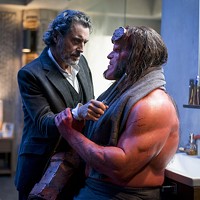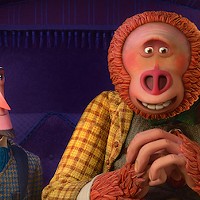

AWAY FROM HER (2007). Iris would appear to have been the first and last word on movies dealing with Alzheimer's disease, yet here comes Away From Her to provide it with troubled company. Like that somber drama, this incisive picture, which marks the assured directorial debut of 28-year-old actress Sarah Polley (The Sweet Hereafter), proves to be a difficult, unsettling watch, all the more so for those who have lost someone to that dreadful disease. Yet what both films also share is a commitment to portraying the ravages of that affliction with clear-eyed honesty, tracking not only the effects on its victims but also on the caretakers who continue to provide support even as their loved ones are fading away right before their eyes. Judi Dench was remarkable in Iris, yet it was Jim Broadbent who walked away with an Academy Award. Similarly, rave reviews have all but assured year-end accolades for Julie Christie's superlative performance, but it's really the Canadian veteran Gordon Pinsent who holds the film together. As his character watches his wife place a frying pan in the freezer or bond with a fellow patient (Michael Murphy) because she can't recall that she even has a husband, he draws us in with his stillness, his whispered frustrations, his seething impotence. His character's silence is deafening; you can hear his heart break a mile away.
DVD extras include audio commentary by Christie and deleted scenes with optional commentary by Polley.
Movie: ***1/2
Extras: **
GEORGIA RULES (2007). Given Jane Fonda's disastrous return to cinema in 2005's Monster-In-Law followed by this summer dud, it's clear that the career resuscitation isn't going exactly as planned. Fonda's Georgia, a family matriarch who runs her household the way a drill instructor lords over greenhorn recruits, is a one-note shrew, and one of this schizophrenic movie's greatest failings is that it never acknowledges that it's this woman's puritanical behavior which started the chain reaction partly leading to the miserable circumstances that plague her daughter Lilly (Felicity Huffman) and her granddaughter Rachel (Lindsay Lohan). Then again, it's not just Fonda's fault that Georgia is a poorly realized character; blame also must be directed at scripter Mark Andrus and director Garry Marshall. Marshall in particular has no clue how to orchestrate the movie's heavy themes involving alcoholism (Lilly), nymphomania (Rachel) and possible child abuse (Rachel claims she was repeatedly molested by her stepdad when she was 12); after all, he's the director who viewed mental retardation as little more than an amusing character quirk in The Other Sister. Here, he tries to lighten the movie's mood by having Rachel give a blowjob to a nice Mormon boy who's seriously trying to serve God (har har) and then painting the lad's girlfriend and her pals as the story's heavies. Worthy mother-daughter sagas reached their zenith with 1983's magnificent Terms of Endearment; Georgia Rule, by contrast, fails to elicit much in the way of any genuine emotion. If there's not a dry eye in the living room when Lilly and Rachel finally hug, it's only because viewers will have ejected the DVD and cleared out by that point.
DVD extras include seven deleted scenes, three alternate endings, a making-of short and a gag reel.
Movie: *1/2
Extras: **1/2
INVASION OF THE BODY SNATCHERS (1978). Those disappointed by the current flop The Invasion are encouraged to rent any of the previous screen adaptations of Jack Finney's sci-fi novel The Body Snatchers, all of which trump this latest incarnation. The 1956 Invasion of the Body Snatchers remains the best of the bunch, but this second take on the tale more than qualifies as a respectable remake. (The third attempt, 1994's Body Snatchers, is flawed but worthwhile.) This time, the setting is San Francisco, with Donald Sutherland as a city health inspector who, along with his friends (Brooke Adams, Jeff Goldblum and Veronica Cartwright), starts to notice that other associates and neighbors aren't quite as animated as they used to be. Cleverly, each film version has been tweaked to speak to its era, so whereas the '56 model dealt with Cold War issues, this one finds director Philip Kaufman and writer W.D. Richter tackling other subjects. On one hand, it's an indictment of how careless Americans are with their own lives, putting all sorts of poisons into their bodies and listening to any new philosophies that happen to emerge on the scene. On the other, it's a typical example of the post-Watergate paranoia thriller running rampant throughout the 70s, specifically warning against the dangers of the right-wing way of thinking: conformist, self-centered and unfeeling toward others (Sutherland even jokes that a pod person is exhibiting the characteristics of a typical Republican). Kevin McCarthy and Don Siegel, the star and director of the 1956 original, both have cameos as, respectively, the frantic man on the street and the taxi driver. And, yes, that's Robert Duvall in a blink-and-you'll-miss-him appearance as the priest on the swing!


